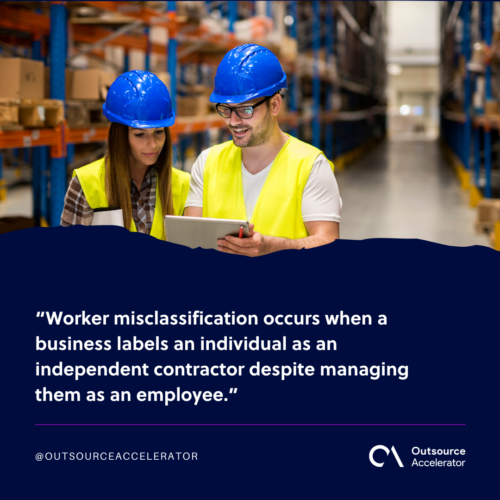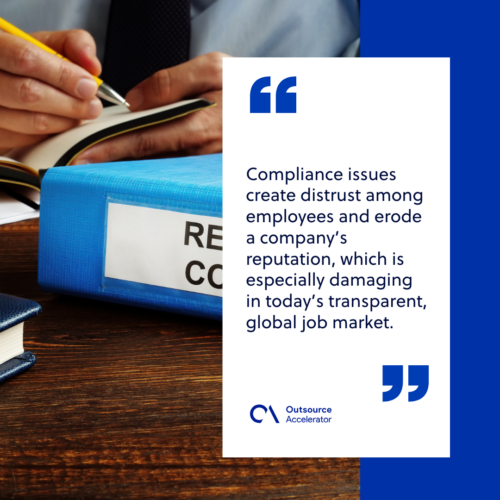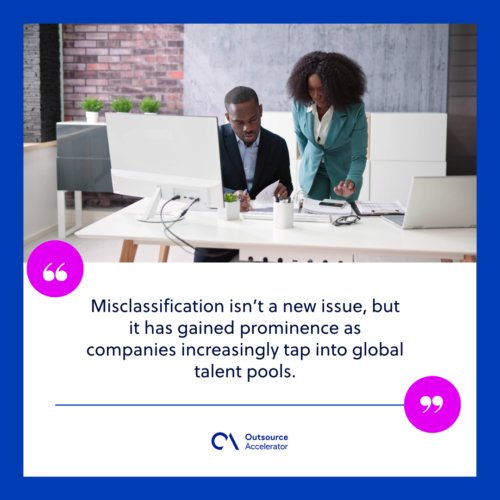Avoid worker misclassification: Complying with International Labor Laws when hiring global talent

This article is a submission by Globaltize. Globaltize is a boutique staffing agency established by seasoned entrepreneurs who have leveraged global talent to grow their businesses. They provide comprehensive staffing solutions, delivering tailored, cost-effective global talent.
Hiring global talent is now easier than ever. With tools like Wise, PayPal, and Deel making cross-border payments seamless, companies can expand their reach and work with skilled professionals from around the world.
However, the ease of making payments or assigning tasks does not exempt businesses from the legal obligations of hiring abroad.
One of the biggest risks in global hiring is compliance, particularly around worker classification.
Worker misclassification—hiring full-time employees under the guise of independent contractors—is a common compliance mistake that can lead to serious legal and financial consequences.
Understanding worker misclassification
Worker misclassification occurs when a business labels an individual as an independent contractor despite managing them as an employee.
This distinction is crucial because misclassified employees miss out on certain protections and benefits, such as health insurance, paid leave, and other entitlements.
Employers often choose the contractor model for ease and cost savings, as contractors are not entitled to the same benefits as employees.
However, misclassification can arise from misunderstandings around local labor laws and definitions, as each country may have its own requirements and legal tests for determining worker status.

The difference between an employee and an independent contractor isn’t just about titles – it’s about autonomy, work dynamics, and legal standing.
Contractors typically operate independently, handling multiple clients, setting their hours, and managing their business activities.
Employees, by contrast, tend to be more reliant on the organization, working set hours, following management’s direction, and depending on the company for stable income.
When a company hires someone as a contractor but manages them as an employee, it risks non-compliance with labor laws, potentially triggering penalties and back payments.
Pitfalls of paying global talent as contractors
While platforms simplify payments, they do not resolve legal classification issues. It’s easy to pay a contractor in another country, but that doesn’t ensure compliance with local labor laws.
If a company dictates a contractor’s tasks, sets their working hours, or is their main income source, they may legally qualify as an employee.
Hiring talent under contractor terms solely for convenience can lead to significant financial and legal exposure.
Consider the control factor: contractors, by definition, should have control over how they accomplish tasks. If an organization sets project timelines, specifies how work should be completed, or requires a certain level of availability, the worker may no longer meet the criteria for a contractor.
This approach may make sense for short-term projects or specialized tasks but can create risks when such arrangements extend indefinitely or involve full-time, core work.
Key differences between independent contractors and employees
The primary distinctions between independent contractors and employees come down to autonomy and dependence.
Independent contractors typically operate as their own business entities by:
- Setting their schedules
- Owning their equipment
- Serving multiple clients
Employees, on the other hand, are typically required to:
- Follow company schedules
- Use company-provided resources
- Depend on a steady paycheck from one organization
Misclassifying these two types of workers can result in serious compliance issues, especially as labor laws tighten globally.
For example, an employee relationship is often marked by a higher level of control by the employer. If a business controls a worker’s methods and hours, they are more likely to be classified as employees, even if labeled as contractors.
Contractors, conversely, are usually given more flexibility on when and how they complete tasks. This distinction extends beyond legal definitions; it also shapes the employer’s relationship with the worker and what each party can expect.
Consequences of worker misclassification
Global labor laws have become more rigorous about worker classification. Countries are increasingly cracking down on companies that attempt to classify employees as contractors, as it often deprives workers of critical benefits and protections.
Penalties for non-compliance can include:
- Fines
- Lawsuits
- Obligation to pay retroactive benefits
For instance, in the US, companies found guilty of misclassification may have to pay back taxes, benefits, and penalties. In the European Union, penalties can be even more severe, as there are stringent protections for workers.
Beyond financial penalties, worker misclassification can severely impact a company’s reputation, both with its workforce and the public. Legal and compliance issues tied to improper classification can deter potential hires and damage relationships with existing staff.
Compliance issues create distrust among employees and erode a company’s reputation, which is especially damaging in today’s transparent, global job market.
Additionally, addressing misclassification after the fact can be time-consuming and resource-intensive, diverting attention from business growth initiatives.

How EOR services simplify global hiring
To avoid the risks associated with worker misclassification, many companies are turning to Employer of Record (EOR) services.
An EOR acts as the legal employer for international hires, ensuring compliance with local labor laws and managing everything from payroll to benefits.
By handling the complex aspects of compliance, EORs simplify the global hiring process and reduce risk for companies expanding across borders.
An EOR allows businesses to scale internationally while maintaining legal compliance in each country where they operate. Rather than navigating the intricacies of each country’s labor laws, companies can rely on an EOR to manage local legal obligations, taxes, and benefits.
This arrangement minimizes administrative burdens and ensures that employees receive fair treatment under local regulations. For businesses, it’s a strategic solution to managing a global workforce without establishing a legal entity in every country.
Importance of compliance for sustainable growth
Compliance with labor laws isn’t just a legal necessity; it’s a fundamental part of sustainable growth.
In the race to expand globally, companies might overlook the regulatory aspects of hiring, but non-compliance can disrupt growth.
Governments worldwide are enforcing stricter regulations to prevent worker misclassification and ensure employee rights, so companies must take compliance seriously.
Failing to do so can result in substantial fines, legal complications, and reputational damage that can undermine long-term success.
The rise of remote work and global hiring has amplified the focus on compliance. As labor laws adapt to this new reality, companies are under increased scrutiny.
Maintaining a compliant workforce is a way to demonstrate commitment to ethical practices and fair treatment, which resonates with both employees and customers. In a competitive market, a reputation for ethical employment practices can be an asset, while compliance issues can be a liability.
Why worker misclassification is a growing concern for global companies
Misclassification isn’t a new issue, but it has gained prominence as companies increasingly tap into global talent pools. Many businesses are unaware of local laws or assume that contractor relationships are easier to manage.
But as authorities clamp down on misclassification, it’s clear that these arrangements must be handled with care.
In the U.S., companies may face penalties under the IRS’s guidelines, while in Canada, the Canada Revenue Agency enforces strict rules around worker classification.
Similarly, European countries are introducing new laws to protect workers, and Asia-Pacific nations are establishing regulations to address the rising number of freelancers.
Labor law violations also carry the risk of retroactive payments for employee benefits, which can severely impact cash flow.
In addition, lawsuits over misclassification may lead to costly settlements and require a complete overhaul of employment policies. The complexities surrounding global hiring are only increasing.
Companies must be proactive in understanding and following the laws in each country where they hire.

How businesses can ensure compliance in global hiring
To manage compliance, companies should take a proactive approach to understand the labor laws in each country they operate. Consulting with legal experts familiar with international employment law can help companies make informed decisions about classification.
Another strategy is to engage with EOR providers that can simplify hiring across borders by managing payroll, benefits, and compliance issues.
Having a structured compliance strategy reduces the risks associated with misclassification. This includes:
- Conducting regular audits of international hires
- Reviewing contractual agreements
- Ensuring that each worker’s classification aligns with their work arrangements
By taking these steps, businesses can minimize legal exposure, protect their reputation, and maintain a productive, engaged workforce.
In many cases, companies may find that working with a global staffing provider can help them avoid the pitfalls of misclassification by streamlining compliance, payroll, and benefits across multiple countries.
Prevent worker misclassification when hiring global talent
Hiring globally offers immense potential for growth, access to diverse talent, and increased innovation.
However, as companies expand, they must prioritize compliance. Misclassifying workers as contractors when they should be classified as employees can result in serious legal, financial, and reputational repercussions.
By staying informed about labor laws and partnering with reputable EOR providers like Globaltize, businesses can confidently hire international talent while minimizing compliance risks.
Global expansion is filled with opportunities, but companies must approach it with a clear understanding of legal obligations to build a sustainable, resilient, and compliant workforce.







 Independent
Independent




